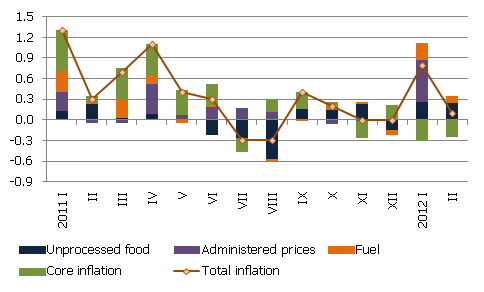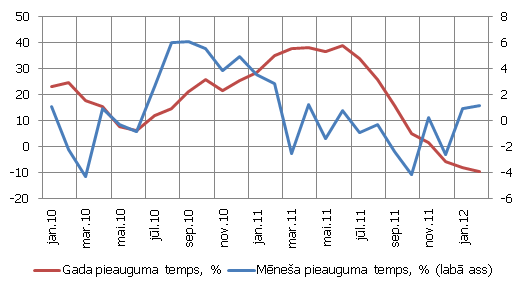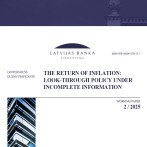In February inflation affected by oil prices, end of seasonal sales
In February 2012 the monthly dynamic of consumer prices was primarily impacted by the rise in oil prices because of which fuel prices continued to climb as well as the end of seasonal sales. Here we are referring to wearing apparel, footwear, household furnishings: these groups still saw price drops. The monthly inflation was thus 0.1%, which is a much lower rise than in January when the prices of natural gas and thermal energy were raised. The annual inflation in February dropped to 3.4%.
Fig.1. Rate of monthly increase in consumer prices, %; the contribution of main goods and services groups, percentage points

Source: Central Statistical Bureau, Bank of Latvia calculations
The current developments in global food prices are still related to the situation in the Southern Hemisphere, primarily South America where low grain harvests are predicted because of draught and in some areas, harvesting difficulties that have a negative impact on price dynamic because of continuous heavy rains.
The impact of food prices on the annual inflation in Latvia is about three times less than a year ago because the harvest of the previous season in the Northern Hemisphere has succeeded in ensuring sufficient stocks and levelling out the prices. The UN Food and Agriculture Organization data indicate that the rise of global food prices in February was 1.1% month-on-month (in the corresponding period of 2011 it was 2.8%), and the rise was already partly impacted by the evaluation of the effect of the harsh winter on grain harvests in the CIS territories, which are the main contributors to the grain supply in the region. Albeit vegetable prices in February already rose substantially (14.2% over January), the prices of the local vegetables in the new season are likely to be reflected in the March data as a seasonal change: the first local grown vegetables are gradually appearing for sale and their prices are usually higher than later, during the season.
Fig. 2. The rate of global food price increases, %

Source: UN Food and Agriculture Organization
The global oil price trends in February were still impacted by the political turbulence in the Middle Eastern oil producer countries, which has acquired a permanent character and in the coming months can have a negative influence on those energy prices that are related to oil products and have an indirect effect on inflation by making the production of other goods and services more expensive. The impact of fuel prices on annual inflation in February remained slightly less than a year ago and amounted to 0.7 pp.
With the risks of oil price impact remaining at the same level, the downward inflation trend could be more pronounced starting April, for the base period for the rise in electrical power tariffs will be over then and later, in June and July, the same will be the case for several indirect taxes (e.g., fuel and tobacco excise tax etc.).
Textual error
«… …»






